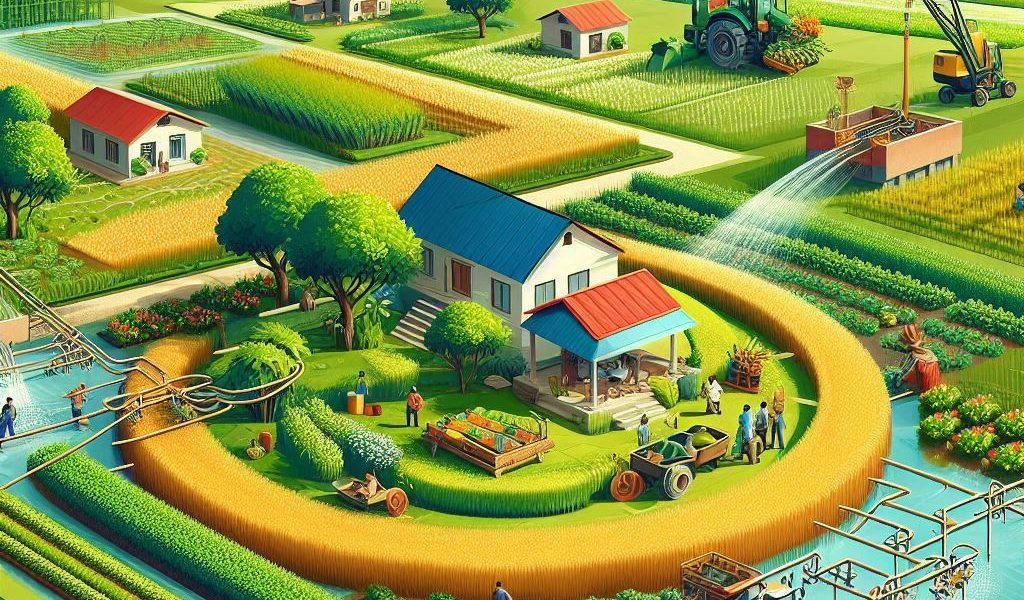Latest Subsidy Programs for Small-Scale Farmers in India: Empowering Agriculture for a Sustainable Future
Agriculture has always been the backbone of India’s economy, providing livelihood to more than half of its population. However, the challenges faced by small-scale farmers in India are manifold, including issues related to low productivity, limited access to modern technologies, lack of financial resources, and vulnerability to market fluctuations. In an effort to address these challenges and ensure the sustainability of farming in India, the government has rolled out various subsidy programs aimed at supporting small-scale farmers. These subsidies play a pivotal role in empowering farmers, enhancing their productivity, and improving their income levels.
This blog delves into the latest subsidy programs for small-scale farmers in India, shedding light on how these financial aids help in promoting sustainable agriculture, increasing farm income, and improving the overall livelihoods of farmers.
Understanding Subsidy Programs for Small-Scale Farmers in India
A subsidy program is a financial support mechanism provided by the government to help reduce the cost of agricultural inputs, improve farm productivity, and enhance the socio-economic status of farmers. These programs are specifically designed to address the challenges faced by small-scale farmers, such as limited access to modern technologies, lack of affordable inputs, and insufficient infrastructure.
Subsidies can cover a variety of areas, including:
- Seed and Fertilizer Subsidy
- Equipment and Machinery Subsidy
- Irrigation Subsidy
- Organic Farming Subsidy
- Crop Insurance Subsidy
- Market Linkage Subsidy
These subsidies aim to make agriculture more accessible, efficient, and profitable for farmers. The government’s role is to ensure that small-scale farmers can access these subsidies with ease, and that they are utilized in ways that directly benefit agricultural productivity and sustainability.
Key Subsidy Programs for Small-Scale Farmers in India
1. PM-KISAN (Pradhan Mantri Kisan Samman Nidhi) Scheme
The PM-KISAN Scheme is one of the most significant initiatives by the Government of India to provide direct income support to farmers. Under this scheme, small-scale farmers receive financial assistance of ₹6,000 per year, paid in three equal installments. The aim is to help farmers meet their day-to-day farming expenses, buy agricultural inputs, and invest in their farm’s sustainability.
- Eligibility: The scheme is applicable to small and marginal farmers, and they must own less than 2 hectares of agricultural land. Landholding must be verified through land records.
- Benefits: Financial support to farmers, which helps reduce their dependency on loans and offers a safety net against crop failures and other uncertainties.
2. Soil Health Management and Fertilizer Subsidy
The Soil Health Management scheme aims to provide subsidies on soil health cards and fertilizers, encouraging farmers to adopt balanced fertilization practices and maintain soil health. Farmers can also avail subsidies for purchasing organic fertilizers and adopting organic farming practices.
- Eligibility: All farmers across the country are eligible to benefit from this program.
- Benefits: The program encourages sustainable farming practices by promoting the use of bio-fertilizers, green manures, and other organic alternatives, improving soil health and crop productivity.
3. National Agricultural Market (e-NAM)
The e-NAM platform is designed to create a nationwide network of common online markets for agricultural products. By offering subsidies on transportation, marketing, and infrastructure development, the government aims to provide small-scale farmers with better access to national markets, helping them get fair prices for their produce.
- Eligibility: Farmers registered under state Agricultural Produce Market Committees (APMCs) can avail themselves of the benefits.
- Benefits: Improved market access, better price discovery, and reduced dependence on middlemen, leading to higher income for farmers.
4. Pradhan Mantri Krishi Sinchayee Yojana (PMKSY)
The PMKSY aims to enhance irrigation coverage and improve water-use efficiency through the construction of irrigation systems and the promotion of water conservation technologies. The scheme focuses on providing subsidies for drip and sprinkler irrigation systems, helping farmers use water more efficiently, especially in water-scarce regions.
- Eligibility: Farmers who require irrigation systems for their farms, particularly in drought-prone areas.
- Benefits: The scheme enhances water-use efficiency, reduces water wastage, and helps farmers increase productivity, especially in regions with erratic rainfall patterns.
5. Rashtriya Krishi Vikas Yojana (RKVY)
The RKVY is a flagship program by the Ministry of Agriculture and Farmers Welfare, aimed at promoting agricultural growth and ensuring holistic development in rural areas. Under this scheme, subsidies are provided for the purchase of agricultural machinery, inputs like seeds and fertilizers, and the construction of cold storage and other infrastructure.
- Eligibility: Farmers, cooperatives, and agricultural societies are eligible for financial assistance under this scheme.
- Benefits: The scheme aims to boost productivity, enhance agricultural infrastructure, and create employment opportunities in rural areas.
6. Kisan Credit Card (KCC) Scheme
The KCC scheme is an important initiative that provides farmers with easy access to short-term credit to finance agricultural needs. The scheme offers subsidized interest rates on loans, allowing farmers to purchase seeds, fertilizers, and other inputs for their farming activities.
- Eligibility: Farmers, including small-scale farmers, landowners, and sharecroppers, are eligible to apply for a KCC.
- Benefits: Access to affordable credit, enabling farmers to meet their financial requirements for purchasing inputs and sustaining their farming activities.
7. Subsidy on Agricultural Machinery and Equipment
The government offers subsidies for purchasing advanced agricultural machinery such as tractors, plows, and harvesters, which are essential for improving the efficiency and productivity of small-scale farming. The objective is to promote mechanization in farming, especially for small landholders.
- Eligibility: Farmers who wish to adopt modern farming techniques and purchase equipment under the program.
- Benefits: By providing subsidies on agricultural machinery, farmers can enhance their productivity and reduce labor costs, making farming more profitable.
8. Crop Insurance: Pradhan Mantri Fasal Bima Yojana (PMFBY)
The PMFBY scheme offers crop insurance to farmers to protect them against unforeseen natural disasters such as floods, droughts, and pests. This scheme provides financial compensation in case of crop loss, ensuring that farmers are not financially burdened by unforeseen events.
- Eligibility: Farmers who grow crops and are enrolled in the scheme through authorized insurance agencies.
- Benefits: Financial protection for farmers, especially during adverse weather conditions, ensuring that their livelihoods are safeguarded.
9. National Mission on Sustainable Agriculture (NMSA)
The NMSA aims to promote sustainable farming practices by encouraging the use of organic inputs, water-saving technologies, and environmentally friendly farming methods. Subsidies are provided to farmers for adopting conservation practices such as mulching, crop rotation, and agroforestry.
- Eligibility: All farmers interested in adopting sustainable agricultural practices.
- Benefits: Enhanced soil fertility, reduced input costs, and improved long-term farm productivity through eco-friendly practices.
How to Apply for These Subsidy Programs
The process of applying for subsidy programs varies depending on the specific scheme, but generally involves the following steps:
- Eligibility Check: Before applying, farmers must ensure that they meet the eligibility criteria for the specific program.
- Submit Application: Farmers can apply online through the relevant government portals or submit their applications to local agricultural offices, depending on the subsidy program.
- Documentation: Ensure that all necessary documents, such as land records, identity proof, and bank details, are submitted along with the application.
- Approval and Implementation: Once the application is processed and approved, farmers can access the financial aid or subsidy. They may be required to provide progress reports or updates during the implementation of the project.
- Monitoring and Evaluation: Government agencies often monitor the use of funds and the outcomes of the subsidy program to ensure its effectiveness in achieving the intended goals.
Benefits of Subsidy Programs for Small-Scale Farmers
- Increased Productivity: Subsidy programs help small-scale farmers access the necessary inputs, equipment, and technologies to increase their productivity. By reducing the cost burden, farmers can invest in modern methods and improve output levels.
- Income Security: Financial assistance and crop insurance programs offer a safety net to farmers, providing them with a cushion during crop failures, natural disasters, or market fluctuations.
- Sustainable Agriculture: Subsidies promoting sustainable farming practices help farmers adopt eco-friendly techniques, leading to long-term soil health, better water management, and increased resilience against climate change.
- Reduced Financial Stress: By providing easy access to credit and financial support, these programs reduce the financial stress that often comes with high input costs and the uncertainty of farming.
- Improved Market Access: Government initiatives like e-NAM help farmers connect with national markets, reducing reliance on middlemen and ensuring better prices for their produce.
Conclusion
The government of India offers a range of subsidy programs that significantly contribute to the empowerment of small-scale farmers. These programs address the challenges faced by farmers, increase productivity, ensure income stability, and promote sustainable farming practices. By availing these subsidies, farmers can improve their livelihoods, reduce financial risks, and contribute to the country’s overall agricultural growth.
For small-scale farmers, staying informed about the latest subsidy programs and utilizing them effectively can be the key to achieving sustainable farming and financial stability. By taking advantage of these opportunities, farmers can overcome barriers, improve their agricultural practices, and build a prosperous future for themselves and their families.




